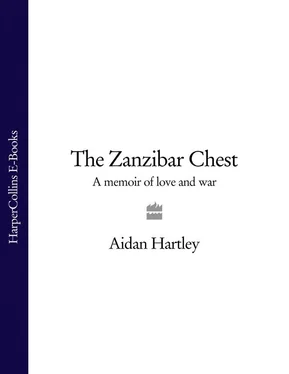Our first family reunion for about a decade took place on Dad’s birthday in 1980. We camped at Lake Naivasha, in Kenya’s Rift Valley, and the whole family fought all weekend. Mum called it the Third World War Weekend. Dad must have suffered confusion about what best to do about his two families, but he capitulated completely to my mother. They were reunited. I remember Mum going around the house, inscribing every book with both his and her names. The farm in Devon was sold and Mum moved back to Kenya. In time the entire crisis blew over; my parents returned to being a double act as they had always been, on the road, like mechanized gypsies.
On my mother’s insistence, Dad took us along on some of his long road trips, so that many of my school holidays were spent on magical safaris along dusty red roads into deserts and forests. Along the way my father’s fascination with the people and places of Africa rubbed off on me. He frequently pointed out of the car window at trees or hills and after hours of driving he would break into singing Slim Dusty’s ‘The Pub With No Beer’, weaving the car from side to side on the corrugated dusty track. Around the campfire at night he continually spoke of the future, of his ambitions and hopes and schemes with the energy of a young, idealistic man.
‘Come, my friends!’ he’d boom, with a raised glass of red wine in one hand, a raw onion or hunk of cheese in the other, commanding silence while he recited his favourite lines of Tennyson, ‘’Tis not too late to seek a newer world!’
He missed what Africa had once been. When we drove through sprawling towns he would describe how a few decades before this had been a savannah of swaying grass teeming with game. But the environmental destruction was still taking place, before our very eyes. At sixteen I remember visiting the Cherangani Hills in western Kenya, where the forest was so thick the sunlight barely pierced the canopy of mighty trees to the track along which we drove. A few months later we passed down the same road and for miles around the trees had been felled and burned and the view was bruised, eroding earth to the distant horizon.
After sixty years in the continent, my father had come to believe that the Europeans had committed an unforgivable error by sweeping away the traditional culture and economy that Africans had evolved over centuries. The nomad who valued nothing more than his cattle stayed on the move because he knew that to settle would mean death. And yet wherever we went, we saw the new independent African governments, backed by white ‘development experts’, repeating the mistakes of the long past colonial rulers, forcing the nomads into sedentary lives, to put up fences, live in tin huts, to swap their magnificent beads and togas for the cast-offs and ragged clothes of the ‘civilized’ West. The missionaries did their damage too and one Sunday I recall arriving in a northern Kenyan hamlet where nomads were gathering in the hope of food handouts from the foreigners, having lost most of their livestock to drought. As they trekked in the American Baptists’ overseers were handing out polyester trousers and T-shirts with slogans that were meaningless to their wearers. Some of the proud warriors were stalking around in flowery blue plastic bath caps. The missionaries had surrounded the village with loudspeakers rigged up onto tall poles and when it came time for a church service the sermon was broadcast at full volume, so that no matter where the nomads were, they would be harangued and cajoled to convert to Christianity and turn their backs on their past lives in return for the food and clothes they were receiving.
For all my father’s enthusiasm his attempts to assist people by enhancing, rather than destroying, their traditions were almost certainly in vain. What he showed me on those road trips had more of an effect on me than anything I learned at school. I had witnessed real injustices, poverty, the arrogance of power, the ignorance of the foreigners, the obliteration of proud cultures and beautiful landscapes.
I should have become an Englishman after sixteen years of education. Instead I was like a homing pigeon. After three happy years at Oxford, I went to the School of Oriental and African Studies (SOAS), formerly a famous training ground for those who wanted to make their lives elsewhere, and now a hotbed of dissidents from the Third World. I set off for Africa almost on the day I had graduated with my Master’s. I hitched down through Europe and met a friend in Cairo. We did Egypt the whole summer: ruins, bazaars and beaches, all fuelled by arak, across-the-counter diazepam and hashish from vendors down in the souk who sold bitten-off measures spat out onto balanced scales. Before I headed south we took a taxi out to Giza, where we dodged the tourist police and gully-gully men and clambered up the great limestone blocks of the Mycerinus pyramid. We reached the summit and there among the graffiti of generations I scratched my name next to another one etched in copperplate. Pickard. Perhaps he had been one of Napoleon’s soldiers, but Pickard had also been my grandmother’s maiden name. Had we been here before? From the top of that monument, 4,500 years old, we watched the sun sink into the desert. A hot wind whipped over the pyramid’s stones with the roar of myriad voices. Darkness fell. The tungsten lights of the son et lumière show flipped on, illuminating us like prisoners in a gaol break for the audience of package-tour holidaymakers. We descended the dark side of the tomb, sliding from one block to the next, scared of slipping and dashing our brains out on the fall down.
I took a train to Aswan, where I embarked on a ferry across the lake to Wadi Halfa and from there on up the Nile by steamer. Lashed alongside the boat, port and starboard, were barges, so that we became a sailing village of backpackers, Sudanese, livestock, market goods, and kiosks serving foul beans and tea. The crew were constantly drunk on arak. When they weren’t under the influence, they assembled to pray on the flat roof of the boat five times daily, leaving the vessel to churn on unguided. It was the dry season upriver in East Africa and we ran aground for hours at a time on sandbanks. I sat on the deck enclosed in mosquito mesh, daydreaming. We continued southwards past little sailboats and fellahin and desert hills dotted with acacias and the Nubian ruins at Meroë. At Dongola I disembarked and took a market truck to Khartoum across a desert called the Belly of Rocks and out there the Milky Way was clearer than I remembered seeing it since I was a child.
On the journey I sat next to a very black man in a brilliant white turban. He touched me on the arm and said, ‘From here on my friend, this is Africa…’
He asked me where I came from. Without pausing I proudly said, ‘Here. Africa is where I was born.’ He smiled.
One evening I lay on my bed in some fleapit village hotel on the Nile riverbanks, woozy from the last of my Cairo supply of diazepam. A song was playing on the radio downstairs in the hotel café. It wafted up the dirty concrete stairs and under the door to where I lay. The hubbub of men’s voices fogged the Arabic lyrics, but as I sweated on my bed and listened I distinctly heard the words:
Hopeless journey, hopeless journey,
Nothing but a
Hopeless, hopeless, hopeless journey…
When I was growing up, my father only gave me a few pieces of advice. I asked him where I should live, what I should do.
‘Make your life somewhere else other than Africa, a place where there’s lots of space,’ he wrote in a letter to me. I asked where he had in mind.
‘Canada,’ he replied. My father was a colonial settler, who had been searching for new frontiers his whole life.
I was looking for a home, not a Canada. And the only home I had ever really had was as a boy in Africa. The memory of that time still had a compelling power over me. As an adult it came back to me in sounds, colours and smells: a mango’s diesel taste, the smell of dust after rain, and the sounds of a picking guitar on the radio. A lost time when the sun shone, before life grew complicated.
Читать дальше












